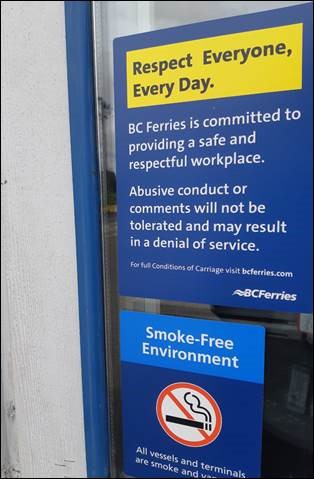Thursday will mark Marcel Desjardin’s 25th year working as an operations supervisor at the BC Ferries terminal in Horseshoe Bay.

While he has enjoyed many aspects of the job — “the people, the good interactions” — he says the bad interactions have become too much to bear.
“They can get pretty bad,” he said. “Borderline threats, physical abuse, things like that.
“Last summer, we had a non-paying customer who wanted to board a ferry, and I had an encounter with him where he threatened to stab me because I wouldn’t let him on the ferry.”
WATCH (June 28, 2019): Long ferry waits expected for Canada Day weekend

It took pepper spray and three police officers to subdue the man and force him from the property, he added.
That’s hardly an isolated incident. As a supervisor, Desjardin said he has to deal with several customer complaints a day over everything from lost tickets to full ferries.
Many of those instances, particularly on weekends, lead to verbal and even physical abuse, he said.
“Name-calling, threats of violence. You name it, it happens,” he said. “It seems every weekend we phone the police to help us with situations.”
Encounters like these slowly but surely affected Desjardin’s home life and his interactions with friends, before seeping into his work.
In November, he was diagnosed with post-traumatic stress disorder after months of sessions with therapists and psychologists. He lays the blame squarely on those bad encounters.

Get breaking National news
“The toll it takes on your mental psyche is incredible,” he said.
Calling for zero tolerance
Desjardin isn’t alone. The BC Ferry & Marine Worker’s Union (BCFMWU) says eight out of 10 ferry workers it surveyed suffer abuse including harassment, threats and physical violence.
The union has launched a campaign urging people to tell BC Ferries that “abuse isn’t ‘part of the job.'” The campaign so far includes digital billboard ads at ferry terminals and a social media push.
A video produced for the campaign contains audio allegedly capturing a ferry customer wishing a worker’s mother gets cancer for not allowing him on a sailing.
The union is calling for BC Ferries to enforce a zero-tolerance policy for worker abuse.
On Friday, ahead of a Canada Day long weekend that was impacted by the removal of a vessel from the Horseshoe Bay-to-Langdale route, BCFMWU provincial first vice-president Kevin Lee said this isn’t the first time the request has been made.
“We’ve been asking for… more than two years,” Lee said. “We’ve raised it at joint safety meetings.”
Desjardin said he’s personally raised the issue with BC Ferries staff, only to be frustrated with the response.
“I’ve asked on many occasions for help, and it’s always a line of questioning that’s met with not a perfect enough answer,” he said.
“I think they should be listening more to their employees, I think they should be engaging their employees more, and I feel the upper management of BC Ferries should be spending time on these terminals during long weekends with these employees to see what’s happening.”
WATCH (April 19, 2019): Long weekend BC Ferries travellers face long waits and confusion

But Lee is not hopeful that will happen.
“I think BC Ferries is more concerned about the experience and the branding than the workers’ safety,” he said.
A changing culture
In a statement to Global News, BC Ferries said it already takes a zero-tolerance stance against abuse and is working to install new messaging at terminals that express that policy.
Those messages say “every employee has the right to a work environment that provides respect for the individual and is free from bullying and harassment,” the company said.

“The company is committed to providing such an environment and will take appropriate action with any individual found to be in contravention of this policy.”
BC Ferries would not provide further comment Monday.
Desjardin said BC Ferries has always been a target of angst in the 40 years he’s lived in B.C., but he has noticed an uptick of “entitled” behaviour in recent years.
He said the time is now for him and other workers to start speaking out against the treatment they receive and to demand more action from their employer.
“I’ve lost sleep over it, I’ve lost friends and family over it,” Desjardin said. “I think people know that this is a problem, just based on the response we’ve seen from the campaign.
“It just has to stop.”









Comments
Want to discuss? Please read our Commenting Policy first.